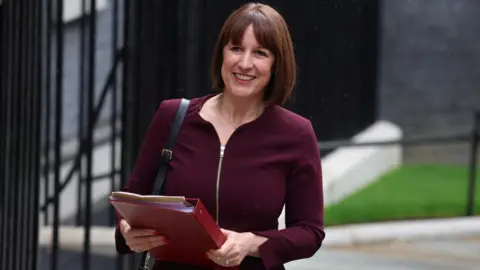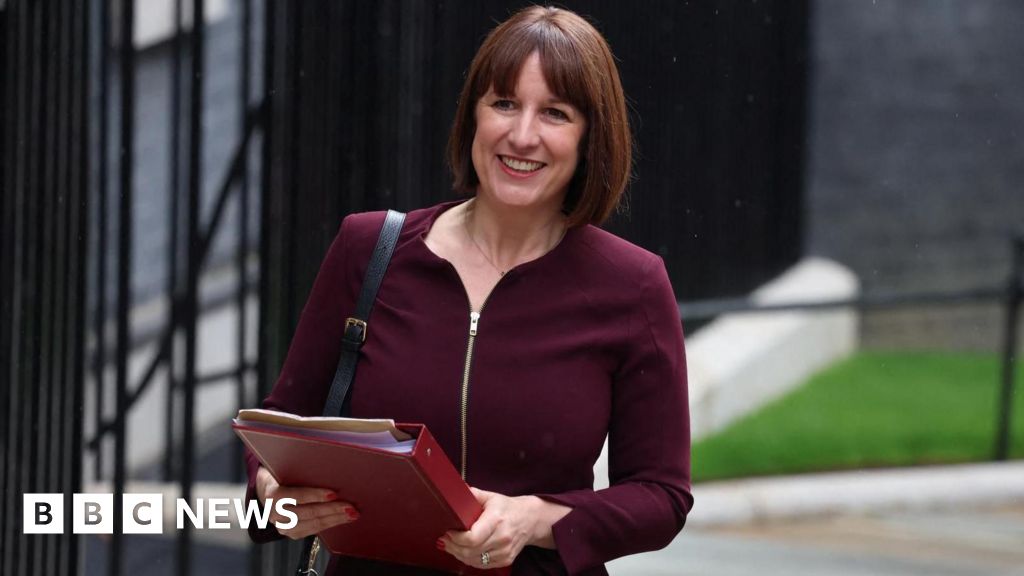By Faisal Islam & Charlotte Edwards, BBC News
 Reuters
ReutersRachel Reeves is expected to announce that she will bring back compulsory housebuilding targets in her first speech as chancellor.
Speaking to business leaders at the Treasury later, Ms Reeves will set out reforms to overhaul Britain’s planning system as part of a wider plan to boost economic growth.
She is also expected to say that with political turmoil in the France and the US, Britain is now back as one of the most stable places for international investment and that the era of “chaos and irresponsibility is over”.
Former Bank of England economist Ms Reeves was appointed chancellor on Friday, after Labour’s landslide election win.
She and her team worked through the weekend on this speech to business leaders and investors who have stalled investment in Britain in recent years amid the political chaos of the post-Brexit years and the Liz Truss mini-budget.
Ms Reeves is expected to announce some immediate loosening of planning red tape that has held back construction, infrastructure, and the energy grid.
It will be done in the hope that investors will unleash tens of billions of pounds of investment in green industry and housebuilding.
Chief Secretary to the Treasury, Darren Jones, told the BBC’s Today programme that planning was the focus of Ms Reeves’ first speech as chancellor because it would boost growth which was “the sustainable way to get public finances back in order for the long run”.
He said that she would offer “immediate measures” to stimulate growth, alongside longer-term plans to to “speed up the delivery of important infrastructure” such as energy, rail or housebuilding.
However, he said communities would “still be able to be a part of the planning process in the normal way”.
“What we are seeking to do is tackle inertia in the system, to speed up the decision making, and then to be able to drive growth through unlocking the investment that we are told is available.”
The Labour manifesto had already promised development on so-called “grey belt” land, which are poor-quality areas in the green belt.
A moratorium on onshore wind power is expected to be lifted, and there will be extra funds for hundreds of new planning officers.
Ms Reeves told the BBC on Friday that she was “willing to have a fight” with those who have delayed and rejected housebuilding and infrastructure investment in the planning system.
On Monday morning, she will tell business leaders: “Last week, the British people voted for change. And over the past 72 hours I have begun the work necessary to deliver on that mandate.
“Our manifesto was clear: ‘Sustained economic growth is the only route to improving the prosperity of our country and the living standards of working people.
“Where previous governments have been unwilling to take the difficult decisions – I will deliver. It is now a national mission. There is no time to waste.”
The chancellor is also expected to claim, based on new Treasury analysis, that the UK economy is £140bn smaller than if it had grown at the same rate as other advanced economies.
Ms Reeves is expected to add: “This could have brought in an additional £58bn in tax revenues last year alone to sustain our public services.
“It falls to this new government to fix the foundations.”
She will not yet announce new tax and spend measures.
This week Ms Reeves will hold a meeting with the Office for Budget Responsibility, and a Budget and Spending Review is expected in the autumn. She also met the governor of the Bank of England on Friday.

During the election campaign, Labour focused largely on tackling housing supply, with a promise to build 1.5 million homes in England over the next parliament.
Labour and the Liberal Democrats both pledged to bring in mandatory housing targets, while the Conservatives did not.
Proponents of compulsory housebuilding targets say they are necessary to make sure councils build the number of houses required.
Opponents, though, say the mandatory approach has been tried unsuccessfully for decades and it risks forcing development on greenfield sites against the wishes of locals.
Roger Mortlock, chief executive of the CPRE, the countryside charity, said it would be questioning whether the greenbelt was the place to start building “when it’s still an idea that has huge public support”.
Speaking to the BBC’s Today programme, he said the CPRE would argue that towns and cities were the best place for housing because they already had the infrastructure.
“The idea that the greenbelt hasn’t been touched [under] the last government is not true – around six to 10,000 homes a year have been built on greenfield sites in the greenbelt since 2009,” he said.
“Very often what they’re creating are car-dependent communities, pock-marking the greenbelt, not delivering anything for the people living there.”


